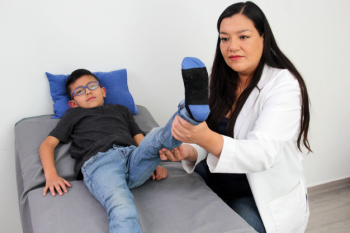Idiopathic Toe Walking in Children
Tuesday, 11 June 2024 00:00
Idiopathic toe walking is a phenomenon where children habitually walk on their toes without any underlying medical condition or known cause. While toe walking is common in toddlers who are learning to walk, persistent toe walking beyond the age of three without any identifiable cause can be a cause for concern. Children with idiopathic toe walking typically walk on their toes with their heels off the ground during most or all of their walking activities. This behavior can affect their balance, coordination, and overall motor development. While the exact cause of idiopathic toe walking remains unclear, it is believed to involve a combination of factors including tightness in the calf muscles, sensory processing issues, or developmental delays. Early intervention is vital in addressing idiopathic toe walking and preventing potential complications such as muscle stiffness or contractions. Treatment may involve specific stretches that can strengthen the calf muscles, orthotic devices to encourage heel contact, and monitoring to track developmental progress and address any underlying issues. If your child has this condition, it is strongly suggested that you seek the advice of a podiatrist who can guide you toward appropriate treatment measures.
The health of a child’s feet is vital to their overall well-being. If you have any questions regarding foot health, contact Dr. Eugenio Rivera of Calo Foot & Ankle Specialists. Our doctor can provide the care you need to keep you pain-free and on your feet.
Tips for Keeping Children's Feet Healthy
- Make sure their shoes fit properly
- Look for any signs of in-toeing or out-toeing
- Check to see if they have Clubfoot (condition that affects your child’s foot and ankle, twisting the heel and toes inward) which is one of the most common nonmajor birth defects.
- Lightly cover your baby’s feet (Tight covers may keep your baby from moving their feet freely, and could prevent normal development)
- Allow your toddler to go shoeless (Shoes can be restricting for a young child’s foot)
- Cut toenails straight across to avoid ingrown toenails
- Keep your child’s foot clean and dry
- Cover cuts and scrapes. Wash any scratches with soap and water and cover them with a bandage until they’ve healed.
If you have any questions, please feel free to contact our office located in Bellaire, TX . We offer the newest diagnostic and treatment technologies for all your foot care needs.









